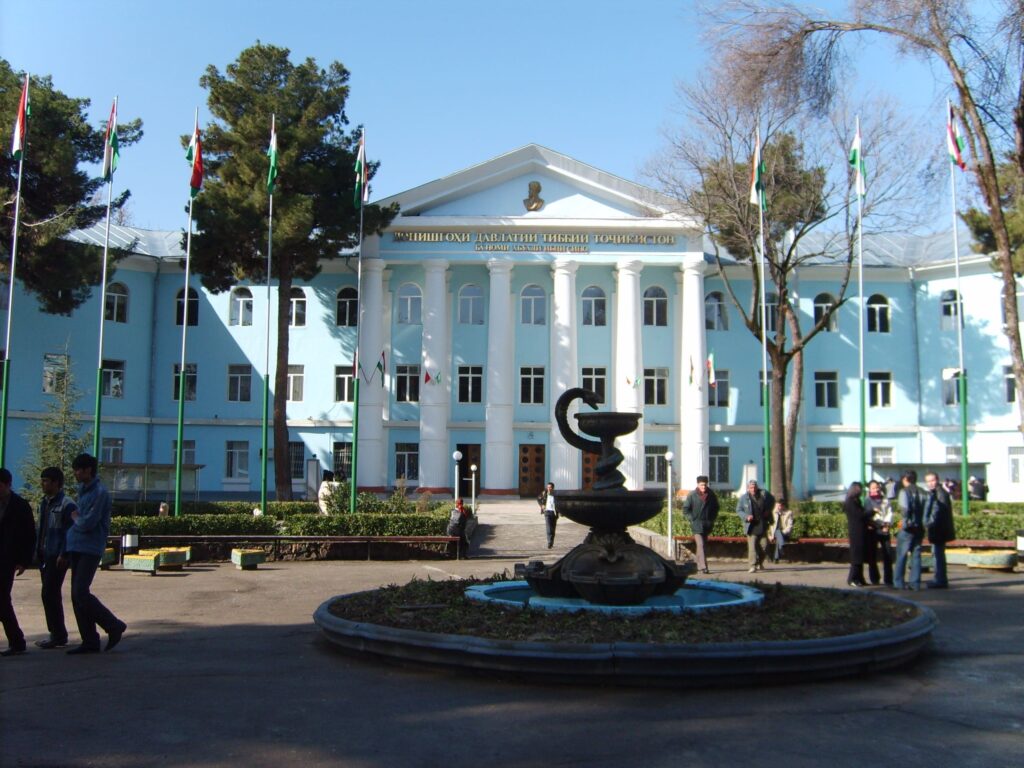MBBS In Tajikistan
— Tenacity Education
About Tajikistan
The Republic of Tajikistan became an independent Nation on September 9, 1991. It was previously home to several ancient cultures. The word Tajikistan means the “Land of the Tajiks”.
Tajikistan has two official languages-Russian and Tajik languages. Though these two are widely spoken in the country, English is also popular among the people for teaching in schools and especially used by the people working in the tourism sector.

Best University In Tajikistan

Avicenna Tajik State Medical University
Avicenna Tajik State Medical University (ATSMU) is one of the prominent medical universities in Tajikistan. Established in 1939, it is located in the capital city of Dushanbe. ATSMU is named after the famous Persian philosopher and physician, Avicenna (Ibn Sina), and is known for its commitment to providing quality medical education. ATSMU offers undergraduate and postgraduate programs in medicine, dentistry, and pharmacy. The university’s curriculum is designed to provide students with a comprehensive understanding of medical sciences and develop their clinical skills. The programs emphasize a combination of theoretical knowledge and practical training to prepare students for their future medical careers.
Fact About Tajikistan
Tajikistan is home to the Pamir Mountains, often referred to as the “Roof of the World.” The Pamir Mountains are part of the larger Pamir Range, and they contain some of the highest peaks in Central Asia, including Ismoil Somoni Peak (formerly known as Peak Communism), which stands at a height of 7,495 meters (24,590 feet). This makes it the highest peak in Tajikistan and the highest point in the former Soviet Union. The rugged and remote nature of the Pamir Mountains has attracted adventurers, mountaineers, and explorers from around the world. The region is known for its stunning natural beauty, unique wildlife, and challenging climbing opportunities.
Why Study in Tajikistan
Education System in Tajikistan
The education system in Tajikistan follows a structure similar to many other countries, with primary, secondary, and higher education levels. Here is an overview of the education system in Tajikistan:
Primary Education: Primary education in Tajikistan starts at the age of six and lasts for four years. It is compulsory and serves as the foundation for further education. The primary curriculum includes subjects such as mathematics, language and literature, natural sciences, social sciences, physical education, and arts.
Secondary Education: Secondary education is divided into two levels: lower secondary and upper secondary.
a. Lower Secondary Education: Lower secondary education, also known as basic general education, typically lasts for five years. Students usually begin lower secondary school at the age of ten. The curriculum includes a wide range of subjects, including mathematics, languages, sciences, social sciences, and humanities.
b. Upper Secondary Education: Upper secondary education in Tajikistan generally lasts for three years and is divided into academic and vocational tracks. Academic upper secondary schools prepare students for higher education, while vocational schools focus on providing practical skills for specific occupations.
Higher Education: Higher education institutions in Tajikistan include universities, institutes, academies, and colleges. Higher education programs typically last for four to six years, depending on the field of study. Tajikistan offers a wide range of disciplines, including humanities, social sciences, natural sciences, engineering, medicine, and agriculture.
Admission to higher education institutions is typically based on entrance exams or completion of secondary education with a specified grade point average. Bachelor’s, master’s, and doctoral degrees are awarded in various fields of study.
Tajikistan’s education system is overseen by the Ministry of Education and Science, which establishes educational policies, sets curriculum standards, and ensures quality assurance in the education sector.
It’s worth noting that the education system in Tajikistan has undergone reforms in recent years to align with international standards and improve the quality of education across all levels.
Student Life in Tajikistan
Student life in Tajikistan offers a unique blend of academic pursuits, cultural experiences, and opportunities for personal growth. Here are some aspects of student life in Tajikistan:
Universities and Campus Culture: Tajikistan has several universities and higher education institutions that provide a vibrant and diverse campus culture. Students have access to modern facilities, libraries, laboratories, and sports complexes. Many universities organize extracurricular activities, clubs, and student organizations, offering opportunities for social interaction, personal development, and pursuing hobbies and interests.
Multicultural Environment: Tajikistan is a multi-ethnic country with a rich cultural heritage. As a student, you will have the chance to meet and interact with fellow students from various backgrounds and ethnicities, fostering cultural exchange and understanding. This multicultural environment can enrich your overall experience and broaden your perspectives.
Student Support Services: Universities in Tajikistan typically provide student support services to help students with academic and personal matters. These services may include academic advising, counseling, career guidance, and assistance for international students. Students can seek support from faculty members and staff who are dedicated to ensuring their well-being and success.
Cultural Events and Festivals: Tajikistan celebrates a variety of cultural events and festivals throughout the year. As a student, you can actively participate in these events, which may include traditional music and dance performances, exhibitions, sports competitions, and cultural showcases. These events offer opportunities to embrace the local culture, engage with the community, and make lasting memories.
Outdoor and Recreational Activities: Tajikistan is known for its stunning natural landscapes, including mountains, lakes, and valleys. Students can take advantage of the beautiful surroundings by participating in outdoor activities such as hiking, camping, and trekking. These experiences not only allow you to explore the country’s natural beauty but also promote physical fitness and overall well-being.
Volunteer and Social Engagement: Many universities in Tajikistan encourage students to engage in community service and volunteer activities. Participating in volunteer work provides opportunities to give back to society, develop leadership skills, and make a positive impact on the local community.
Overall, student life in Tajikistan offers a balance between academic pursuits, cultural experiences, and personal growth. Embracing the opportunities available and immersing yourself in the diverse student community can make your time in Tajikistan rewarding and memorable.
Disadvantages of MBBS in Tajikistan
While there are benefits to studying MBBS (Bachelor of Medicine, Bachelor of Surgery) in Tajikistan, it’s important to consider potential disadvantages as well. Here are some factors that could be considered disadvantages of pursuing an MBBS degree in Tajikistan:
Language Barrier: The primary language of instruction in Tajikistan is Tajik, which may pose a language barrier for international students, particularly if they are not fluent in Tajik or Russian. Some universities offer English-taught programs, but the availability and quality of these programs may vary. It is essential to carefully research the language requirements and ensure that you can adequately understand the curriculum and interact with patients during clinical training.
Accreditation and Recognition: Not all medical universities in Tajikistan have international accreditation or recognition. It is crucial to verify the accreditation status of the university you plan to attend, as it can impact the acceptance of your degree in other countries for further studies or professional practice. Graduating from a non-recognized or non-accredited university may present challenges when seeking employment or pursuing postgraduate opportunities in certain regions.
Infrastructure and Resources: While some universities in Tajikistan have modern facilities and resources, others may have limited infrastructure and outdated equipment. Inadequate infrastructure can impact the quality of education and limit practical training opportunities, particularly in medical fields that require hands-on experience.
Quality of Education: The quality of education may vary among different universities in Tajikistan. While there are reputable institutions, others may have lower academic standards. It is important to thoroughly research the university, faculty qualifications, curriculum, and teaching methods to ensure that you receive a quality education that meets your expectations and career aspirations.
Limited Clinical Exposure: Tajikistan’s healthcare system may have limitations in terms of clinical exposure and access to advanced medical technologies and facilities. Clinical training opportunities may vary, and the availability of specialized departments and exposure to a diverse range of medical cases may be limited compared to more developed healthcare systems.
Cultural and Social Adjustment: Tajikistan has its own unique cultural norms and social dynamics. Adjusting to a new culture, language, and social environment can be challenging for international students. It’s important to consider the potential cultural differences and the support services available to assist with the transition.
It’s crucial to conduct thorough research, consider personal preferences and goals, and weigh the advantages and disadvantages before deciding to pursue an MBBS degree in Tajikistan or any other country.
